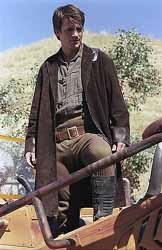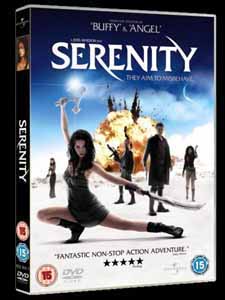|
Canadian-born actor Nathan Fillion originally starred as
Captain Malcolm Reynolds on the TV series Firefly,
having previously been a regular on One Life to Live
and Two Guys, a Girl, and a Pizza Place. Fillion has
also played small roles in the films Blast from the Past
(1999) and Saving Private Ryan (1998). He first
worked with Firefly/Serenity
creator Joss Whedon when he played preacher Caleb, a villain,
in season
seven of Buffy the Vampire Slayer. When
Firefly was prematurely cancelled in late 2002, Whedon
vowed to resurrect the series. Fillion finally got a chance
to play Captain Reynolds again in the feature film Serenity.
We caught up with him as Serenity
was due for release on DVD...
ReviewGraveyard:
What's it been like to see your character go from being in
a cancelled TV show to the big screen?
Nathan
Fillion: It's been good, nothing like a major motion picture
to make you feel better about having your TV show cancelled.
RG:
What was different about the show and this movie compared
to Star Trek and to Star Wars that made people
notice it and become fans?
NF: I think that's Joss Whedon's talent. He writes interesting
people, I love my character. And I love the stories and the
relationships. I think that's what the fans invest in. It
takes them by the heart. I
think Joss Whedon's view of the future is extremely. realistic.
I don't see aliens around us right now. I don't see any reason
there would be tons of aliens 500 years from now.
RG:
When Star Trek made the leap from TV to the big screen,
the show had been playing for years. In your case it's fascinating
that there is a cult based on a recently cancelled show?
NF: I wonder what would've happened to Star Trek then
if they had the technology, the Internet, DVD technology,
box sets.
RG:
What is your perspective on it?
NF:
I didn't move on very well. I was very bitter. I wasn't prepared
[laughs]. I didn't see it coming.
RG:
How did you get the news?
NF:
Joss came down to the set while we were working.
We
were so afraid that the last three days that were left were
going to be torture, and we went in and everybody was determined
to have a great time.
RG: How did you react when Firefly
came out on DVD and it became such a hit?
NF: The show getting cancelled was a downer because we thought
we had a great show. The DVD selling well was like a little
pat on a back, like a consolation prize. It said "guys, you
weren't doing anything wrong".
RG:
How did you originally get the role on Firefly?
NF:
My manager told me about this new sci-fi western, and I said
"what???" And he said "yeah, it's Joss Whedon", and I had
auditioned for Angel when Buffy first came around.
So I was well aware of his talent and I had a couple of friends
on Buffy. So I was intrigued, read it... It
was the treatment written play by play how the script was
going to be, it hadn't been written yet. I had a holding deal
with 20th Century Fox. It was like "we'll give you a job,
we don't have anything yet but just hang in tight", and they
set me up with a meeting with Joss Whedon.
I was in his office, Amy Brit was there I remember, she's
lovely, and there's this guy in the corner with this purple
sweater with a big hole in it, scraggly red hair and big red
wiry beard. I was thinking "who is this guy and when is Joss
Whedon going to get here?" We sort of started chatting and
I realised that that was Joss. We spent about 45 minutes chatting
about the show, and that's how I got my audition and eventually
the show.
RG:
You started in soap opera One Life to Live. It's a
double edged sword; a great starting point but you get easily
stuck?
NF: Bob (Robert) Woods, he played my uncle, he played Bo Buchanan,
I was Joy Buchanan, and two years into my three year contract
he pulled me aside and said "look, I'm here to tell you that
they are going to come and renegotiate your contract. I'm
telling you, say no. The harder you say no, the harder they
are going to make it to leave. They offer you more money,
but daytime drama is the golden handcuffs; they're gold but
they're handcuffs. If you leave and go to LA and try it out,
and if it doesn't work out they'll take you back, so go out
there and try your luck". So every time I go to New York,
I buy Bob a bottle of something nice.
RG: Did you base your character on
anyone?
NF: A friend of mine grew up in Texas and he worked on a farm
with his grandfather. He would tell me these amazing stories
of his grandfather who can't be flustered. This one story
that particularly struck me was, they were castrating bulls.
The process is that you throw them into this stall, close
the gate behind them, do your business and get the next one
in there. While they're getting this one bull in, they're
shutting the gate, the bull kicked and hit the gate between
his thumb and a post. And it severed his thumb which remained
inside his glove, but it was hanging. He was "oh well, we
have six more to do, so let's keep this going". He didn't
show the pain in any way. And there's my friend Cory, 9-10
years old going "grandpa, you have to go to the hospital",
crying. Because of him he decided to go, but I think he was
a tough man. He's had some hard living. That's the kind of
man I imagined Malcolm to be, he grew up on a ranch. He's
a hard worker, not somebody who cries from a little pain.
 |
RG:
Is there some Han Solo in him as well?
NF: That comparison can be made, and it's often made. I'm
glad for it because I'm a big fan of Han Solo, but if you're
going to this movie expecting Han Solo I think you'd be disappointed.
But I do enjoy this character. Malcolm is a little crankier
and more weird than Han Solo. If I invited Han Solo to a party,
I wouldn't invite Malcolm.
RG:
Were there any scenes that you remember thinking were silly
because the sets were not that detailed and got finished later
digitally?
NF: Anything with green screen you have to release. When I'm
on set anything I do when I'm acting I have complete control
over, when I have interaction with other people I share that
control with them. When you're looking at the green screen
you're sharing that power, relinquishing that end of it to
somebody else entirely, with a computer who is going to work
on it for months. And we've got some clever guys doing that.
So when you're staring at the green screen and Joss is telling
you that there's something really scary up there, and you
look at a big pink taped X on the screen, you're going "This
will be good, I know it. I'll leave it up to these guys".
RG:
What kind of training did you do for Serenity?
NF:
I was in a 'fight club'. I was there barely three weeks. And
I would complain about my time there, and every time I'd come
in there I'd see Summer doing her thing, kicking something
above her head about 60 times. I'd be warming up and doing
my stuff, cool down and leave, and she's in the corner fighting
nine guys. And she had to start months before us. She worked
really hard.
RG: What about with guns?
NF:
We got to fire off a lot of really cool looking futuristic
weapons and they brought in a quick draw artist; the fastest
drawer in the world. And he taught me how to quick draw.
I wasn't bad. My drawback is that my gun is very long, so
you have to pull it high and then drop your shoulder. Instead
of pulling it up in front of you, you actually have to pull
it back first.
RG:
What's next for you?
NF: I've got a horror movie coming out called Slither.
RG:
Thank you for your time.

With
thanks to Emma Carter at New Media Maze
Serenity
is released to own and rent on DVD and UMD from Universal
Pictures UK on the 27 February 2006
Order
this DVD for £13.99 (RRP: £19.99) by clicking
here
Order
this UMD for £14.99 (RRP: £19.99) by clicking
here
Return
to...

|